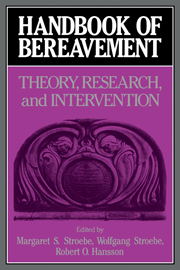Book contents
- Frontmatter
- Contents
- Contributors
- Preface
- Part I Introduction
- Part II The phenomenology and measurement of grief
- Part III Current theories of grief, mourning, and bereavement
- Part IV Physiological changes following bereavement
- Part V The psychological, social, and health impacts of conjugal bereavement
- Part VI Grief reactions to different types of loss
- Part VII Coping, counseling, and therapy
- 23 The meaning of loss and adjustment to bereavement
- 24 Old age and widowhood: Issues of personal control and independence
- 25 The support systems of American urban widows
- 26 The role of social support in bereavement
- 27 Bereavement self-help groups: A review of conceptual and methodological issues
- 28 Counseling and therapy of the bereaved
- Part VIII Conclusions
- References
- Author index
- Subject Index
25 - The support systems of American urban widows
Published online by Cambridge University Press: 04 May 2010
- Frontmatter
- Contents
- Contributors
- Preface
- Part I Introduction
- Part II The phenomenology and measurement of grief
- Part III Current theories of grief, mourning, and bereavement
- Part IV Physiological changes following bereavement
- Part V The psychological, social, and health impacts of conjugal bereavement
- Part VI Grief reactions to different types of loss
- Part VII Coping, counseling, and therapy
- 23 The meaning of loss and adjustment to bereavement
- 24 Old age and widowhood: Issues of personal control and independence
- 25 The support systems of American urban widows
- 26 The role of social support in bereavement
- 27 Bereavement self-help groups: A review of conceptual and methodological issues
- 28 Counseling and therapy of the bereaved
- Part VIII Conclusions
- References
- Author index
- Subject Index
Summary
Many characteristics of a society, a community, and a person influence the organization of that person's life at any stage, as well as the degree of its disorganization introduced by dramatic events. For example, American society tends to be voluntaristic, in that social involvement of adults is mainly dependent on their own initiative. This is particularly true when prior involvements, in the form of social roles, the social relationships they contain, and support systems, are broken by choice or through life events. The voluntaristic nature of the society can be a problem for persons who were not originally socialized into such initiating behavior or who do not have in their self-concept the self-confidence to enter new social relationships and social roles. The traditional American culture discouraged women from assertive social engagement outside the private sphere of the home and related interactions. They were often dependent on others as connecting links between themselves and the public sphere. This is now particularly true of older, less educated women. In contrast, younger women are likely to have greater knowledge of the urban world and its resources and also the self-confidence that enables voluntaristic building and reconstruction of support systems.
This chapter examines the support systems of American urban women whose lives have been disorganized by the death of their husband, in order to determine the extent to which they are dependent on traditional support networks versus broader societal resources.
- Type
- Chapter
- Information
- Handbook of BereavementTheory, Research, and Intervention, pp. 381 - 396Publisher: Cambridge University PressPrint publication year: 1993
- 14
- Cited by



